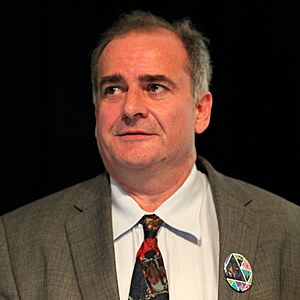Caspar Bowden facts for kids
Quick facts for kids
Caspar Bowden
|
|
|---|---|

Caspar Bowden at the Congress on Privacy & Surveillance (2013) of the École Polytechnique Fédérale de Lausanne
|
|
| Born | 19 August 1961 London
|
| Died | 9 July 2015 (aged 53) |
| Nationality | British |
| Alma mater | Magdalene College, Cambridge |
| Known for | Humans Rights and privacy advocacy |
| Political party | Labour |
| Spouse(s) | Sandi Bowden |
| Relatives | Simon Bowden (brother) Malcolm Bowden (brother) |
| Awards | Winston award (2000) |
| Signature | |
 |
|
Caspar Pemberton Scott Bowden (born August 19, 1961 – died July 9, 2015) was a British expert who worked to protect people's privacy. He was known for speaking up about how governments and companies collect personal information. Before becoming a full-time privacy advocate, he worked as a chief privacy adviser at Microsoft. Caspar was also on the board of the Tor anonymity service, which helps people browse the internet more privately. He famously predicted that governments were running huge surveillance programs, like PRISM, even before the Snowden leaks revealed them to the world. His warnings became very important after those leaks proved he was right.
Contents
Who Was Caspar Bowden?
Caspar Bowden was a smart and dedicated person who spent much of his life fighting for everyone's right to privacy in the digital age. He believed that people should have control over their personal information online.
Early Life and Education
Caspar was born in London, England. He showed a talent for science from a young age. He went to Westminster Under School and then the famous Westminster School. Later, he studied Mathematics at Magdalene College at the University of Cambridge. After college, he worked as an entrepreneur in technology before joining Goldman Sachs, a big financial company.
Standing Up for Privacy
Caspar became interested in privacy rights in 1997. This was when the UK government planned to make it easier for them to access encrypted messages. He helped start the Foundation for Information Policy Research (FIPR) in 1998. This group worked to protect privacy and digital rights. For his efforts against a law called the Regulation of Investigatory Powers Act 2000, which allowed more government surveillance, he received the Winston award in 2000.
Fighting for Digital Rights
In 2002, Caspar joined Microsoft as a Senior Privacy Strategist. He worked in Europe, the Middle East, and Africa. He later became a Chief Privacy Advisor for Microsoft in the UK. During his time there, he strongly disagreed with a US law called the Foreign Intelligence Surveillance Act (FISA). This law allowed the US government to watch people who were not US citizens more easily. Caspar called this "guilty of being a foreigner."
He openly said that if governments used Microsoft's online services, the US National Security Agency (NSA) could spy on that data without limits. Because he spoke out so strongly, he left Microsoft in 2011.
Warnings About Surveillance
Even before Edward Snowden shared secret documents in 2013, Caspar had warned about mass surveillance. In 2012, he wrote a report about how the USA might be using European online services to watch people's data. When Snowden's leaks happened, they proved Caspar's warnings were true. He said he had suspected a program like PRISM existed during his time at Microsoft, even if he didn't know its name.
In 2013, Caspar wrote a report for the European Parliament about the US FISA law. He explained how it affected the basic rights of people in Europe. In an interview with The Guardian, he said he didn't trust Microsoft anymore. He started using tools like Tor and Qubes OS to stay private online. He also removed all Microsoft products from his own computers and stopped using a mobile phone. He joined the Advisory Council of the Open Rights Group to continue his work.
In 2014, he gave a talk called The Cloud Conspiracy at a big technology conference. He explained how he had figured out the details of PRISM just by looking at public information. He also talked about how European leaders didn't react much to his warnings.
His Legacy
Caspar Bowden lived in London and Toulouse, France. He passed away on July 9, 2015, at the age of 53, due to melanoma, a type of cancer. He was survived by his wife, Sandi, and his brothers, Malcolm and Simon. Before he died, he asked that people work to make sure everyone has equal privacy protection, no matter what country they are from.
After his death, he received two important awards: the Liberty Lifetime Achievement Award (2015) and the EFF Pioneer Award (2015). These awards recognized his lifelong dedication to privacy.
To continue his important work, The Caspar Bowden Legacy Fund was created on July 12, 2015. This fund supports privacy advocacy and technology, helping to keep his fight for digital rights alive.
 | Bessie Coleman |
 | Spann Watson |
 | Jill E. Brown |
 | Sherman W. White |

